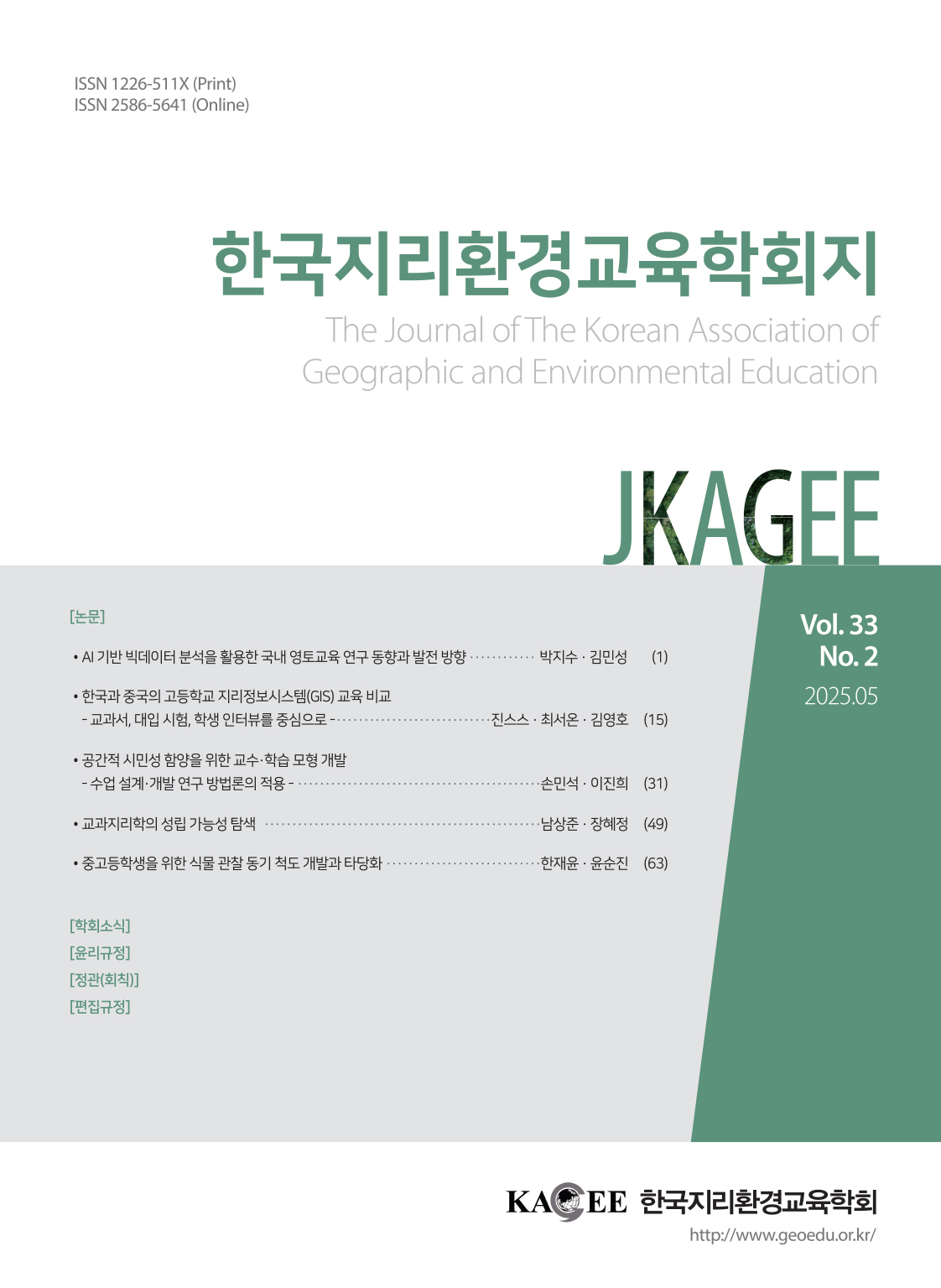Research Article
Abstract
References
Information
This study aimed to explore whether there are differences in environmental competencies among elementary school students based on their camping experiences, frequency of camping activities, and types of camping activities. The results revealed that, overall, there were no statistically significant differences in the sub-factors of environmental competencies based on whether elementary students had camping experience, the frequency of camping activities, or the types of camping activities. However, some specific items within the sub-factors of environmental competencies showed statistically significant differences. The findings of the study are as follows: First, elementary students with camping experience tended to enjoy participating in nature-based ecological activities and were more likely to perceive themselves as important contributors to solving local community issues compared to students without camping experience. Second, elementary students with higher frequencies of camping activities demonstrated awareness of the impact of their habits on the environment, expressed interest in global environmental issues, exhibited a capacity to retain environmental images for an extended period, and demonstrated a willingness to express their feelings about the environment through songs or drawings. Third, elementary students who engaged in camping with a focus on consumption were more adept at grasping important content related to environmental issues than students participating in appreciation and sports-oriented camping. Additionally, they exhibited a higher ability to articulate their thoughts on these issues verbally.
본 연구는 초등학생의 캠핑 경험, 캠핑 활동 빈도, 캠핑 활동 유형에 따라 환경 역량에 차이가 있는지 탐색하고자 하였다. 결과적으로 본 연구가 알아보고자 한 초등학생의 캠핑 활동 경험의 여부, 캠핑 활동 빈도, 캠핑 활동 유형은 전체적인 환경 역량의 하위 요소에 통계적으로 유의한 차이가 없었다. 그러나 몇 가지 하위 환경 역량의 문항에서는 통계적으로 유의한 차이를 보였다. 연구의 결과는 다음과 같다. 첫째, 캠핑 경험이 있는 초등학생은 경험이 없는 학생보다 자연생태 체험 활동에 참여하는 것을 좋아했고, 우리 마을의 문제 해결을 위해 자신을 중요한 구성원으로 인식하는 경향이 높았다. 둘째, 캠핑 활동 빈도가 높은 초등학생은 빈도가 적은 학생보다 자신의 습관이 환경에 미치는 영향을 알며, 전 세계의 환경 문제에 관심을 보이는 것으로 나타났다. 또 환경 영상을 오래 기억하기도 하고, 환경에 관한 자신의 느낌을 노래나 그림으로 표현할 수 있다는 의지를 보였다. 셋째, 소비 유형의 캠핑을 한 초등학생이 감상과 스포츠 유형의 캠핑을 한 학생보다 환경 쟁점에 대해 중요한 내용을 파악할 수 있었고, 그에 대한 자신의 생각을 말로 표현하는 능력이 높은 것으로 나타났다.
- 강영식, 2015, “숲 체험활동에 대한 유아교사들의 인식 및 요구에 관한 연구”, 한국산학기술학회 논문지, 16(8), 5189-5197. 10.5762/KAIS.2015.16.8.5189
- 고성우·홍승호, 2010, “제주 곶자왈 숲 자연 놀이 체험 학습이 초등학생의 환경 감수성 변화에 미치는 영향”, 환경교육, 23(3), 97-114.
- 권기남·이주혁·이정래, 2015, “인문,사회과학편 : 캠핑활동의 사회문화적 의미 읽기”, 한국체육학회지, 54(4), 123-137.
- 권영락·이재영·김찬국·안재정·서은정·남윤희·박은화·최소영·안유민, 2016, “2015 개정 환경 교육과정의 개정 방향과 주요 내용”, 환경교육, 29(4), 363-383.
- 김정숙·정미선, 2009, “뒷산 체험 활동이 아동의 환경 감수성과 인지 능력에 미치는 영향”, 환경교육, 22(4), 14-25.
- 김현정·유광민·김남조, 2014, “가치, 기후변화 문제지각 및 개인적 책임이 관광객의 친환경 행동에 미치는 영향”, 관광연구논총, 26(4), 43-66.
- 김홍일·고종보, 2012, “오토캠핑 마니아의 동기에 관한 연구”, 관광학 연구, 36(5), 199-219.
- 문화체육관광부, 2021, 2021 국민여가활동조사.
- 박경옥·이상원, 2017, “환경기념일을 활용한 환경교육이 초등학생의 환경교육 핵심역량에 미치는 효과”, 한국초등교육, 28(3), 91-108.
- 서은정·류재명, 2014, “환경교육에서 중점을 두어야 할 역량”, 한국지리환경교육학회지, 22(2), 109-123.
- 서은정, 2017, “2015 개정 환경 교육과정에서의 역량 탐색”, 환경교육, 30(3), 237-250. 10.17965/kjee.2017.30.3.237
- 송병국·오해섭·이채식·오대진, 2002, “청소년의 야영활동 참여와 프로그램 개선방안에 관한 연구”, 한국농촌지도학회지, 9(1), 121-130.
- 이재붕·이두곤, 2006, “환경감수성 측정을 위한 검사 도구 개발과 이를 이용한 환경감수성 측정”, 환경교육, 19(3), 138-149.
- 이주형, 2013, “도시녹지공간에서의 휴양행태 및 태도에 관한 국제비교 연구”, 한국산림휴양학회지, 17(4), 41-47. 10.34272/forest.2013.17.4.005
- 인천광역시교육청 그린스마트미래학교추진단, 2023, 인천그린스마트미래학교 업무 매뉴얼.
- 장미정·임수정·정철·홍선욱·이종명, 2018, “해양환경소양과 핵심역량에 기초한 초·중학교 해양환경교육 교재 개발”, 환경교육, 31(2), 153-166.
- 전부기·서보욱·김도연·이주형, 2015, “자연체험을 고려한 지속가능한 생태캠핑 평가항목에 관한 연구”, 한국산림휴양학회지, 19(2), 63-76.
- 정희라·최지선·백성희, 2020, “초등학생 환경역량 검사도구의 개발”, 환경교육, 33(4), 364-376.
- 최현정·윤여창, 2000, “환경보전 행위와 자연관련 경험과의 관계 연구”, 환경교육, 13(1), 53-64.
- 함선옥·김혜지·김학준, 2018, “캠핑 이용자의 소비행동 분석”, 관광레저연구, 30(10), 79-94. 10.31336/JTLR.2018.10.30.10.79
- 한국관광공사, 2021, 2020년 기준 캠핑 이용자 실태조사 보고서.
- Adamovich, V., Nadda, V., Kot, M., and Haque, A., 2021, Camping vs. Glamping Tourism: Providers’ Perspective in the United Kingdom,
Journal of Environmental Management and Tourism , 12(6), 1431-1441. 10.14505//jemt.v12.6(54).01 - Ahn, C. S. and Lee, M. S. W., 2015,
Adventure campers, fairy tale glampers, and authenticity , In 6th Advances in Tourism Marketing Conference, Joensuu, Finland. - Anderson, C. V., 1979, Camping history. In Graendorf, W. C. & Mattson, L. D.(Eds.),
Introduction to Christian camping (pp. 33-47) , Chicago, IL: Moody Press. - Bennett, L. W., Cardone, S., and Jarczyk, J., 1998, Effects of a therapeutic camping program on addiction recovery: The Algonquin Haymarket relapse prevention program,
Journal of substance abuse treatment , 15(5), 469-474. 10.1016/S0740-5472(97)00222-5 9751006 - Brochado, A. and Brochado, F., 2019, ‘What makes a glamping experience great?’,
Journal of Hospitality and Tourism Technology , 10(1), 15-27. 10.1108/JHTT-06-2017-0039 - Brooker, E., and Joppe, M., 2013, Trends in camping and outdoor hospitality-An international review,
Journal of outdoor Recreation and Tourism , 3, 1-6. 10.1016/j.jort.2013.04.005 - _____________________, 2014, A critical review of camping research and direction for future studies,
Journal of vacation marketing , 20(4), 335-351. 10.1177/1356766714532464 - Burch Jr, W. R., 1965, The play world of camping: Research into the social meaning of outdoor recreation,
American J ournal of Sociology , 70(5), 604-612. 10.1086/223935 14269219 - Cordell, H. K., Betz, C. J., Bowker, J. M., English, D. B. K., Mou, S. H., and Bergstrom, J., 1999,
Outdoor recreation in American life: A national assessment of demand and supply trends , Champaign, IL: Sagamore Publishing. - Craig, C. A., 2020, Camping, glamping, and coronavirus in the United States,
Annals of Tourism Research , 89, 103071. 10.1016/j.annals.2020.103071 33082612 PMC7561296 - Daskolia, M. and Flogaitis, E., 2003, Theoretical Formulation and Empirical Investigation of a Conceptual Model of Teachers' Competence in Environmental Education,
Canadian Journal of Environmental Education , 8(1), 249-267. - Dunlap, R. E. and Heffernan, R. B., 1975, Outdoor recreation and environmental concern:An empirical examination,
Rural sociology , 40(1), 18-30. - Filipe, S., Santos, C. A., and Barbosa, B., 2018,
TOURISTS’ MOTIVATIONS AND OBSTACLES FOR CHOOSING GLAMPING: AN EXPLORATORY STUDY , In CBU International Conference Proceedings. 10.12955/cbup.v6.1142 - Garst, B. A., Williams, D. R., and Roggenbuck, J. W., 2009, Exploring early twenty-first century developed forest camping experiences and meanings,
Leisure Sciences , 32(1), 90-107. 10.1080/01490400903430905 - Geisler, C. C., Martinson, O. B., and Wilkening, E. A., 1977, Outdoor recreation and environmental concern: A restudy,
Rural sociology , 42(2), 241-249. - Gration, D., Raciti, M., and Walters, G., 2015, Back to nature: Festivalgoer environmental beliefs and camping experience at non-urban festivals,
International Journal of Event and Festival Management , 6(3), 282-302. 10.1108/IJEFM-02-2015-0008 - Gursoy, D. and Chen, B. T., 2012, Factors influencing camping behavior: The case of Taiwan,
Journal of Hospitality Marketing & Management , 21(6), 659-678. 10.1080/19368623.2012.627239 - Holman, T. B. and Jacquart, M., 1988, Leisure-activity patterns and marital satisfaction: A further test,
Journal of Marriage and the Family , 69-77. 10.2307/352428 - Hong, Y., Cai, G., Mo, Z., Gao, W., Xu, L., Jiang, Y., and Jiang, J., 2020, The impact of COVID-19 on tourist satisfaction with B&B in Zhejiang, China: An importance-performance analysis,
International Journal of Environmental Research and Public Health , 17(10), 3747. 10.3390/ijerph17103747 32466326 PMC7277170 - Hoover, K. S., 2021, Children in nature: exploring the relationship between childhood outdoor experience and environmental stewardship,
Environmental Education Research , 27(6), 894-910. 10.1080/13504622.2020.1856790 - Louv, R., 2008,
Last Child in the Woods: Saving our Children from Nature-Deficit Disorder , Algonquin Books of Chapel Hill. - Panganiban-Lualhati, G., 2017, Filipino student teachers’ environmental competencies: Basis for development of a training module,
Asia Pacific Journal of Multidisciplinary Research , 5(1), 62-72. - Rice, W. L., Mateer, T., Taff, B. D., Lawhon, B., Reigner, N., and Newman, P., 2020, The COVID-19 pandemic continues to change the way people react outdoors,
The Pennsylvania State University Department of Recreation, Park, and Tourism Management . https://doi.org/10.31235/osf.io/dghba. 10.31235/osf.io/dghba - Thapa, B., 2010, The mediation effect of outdoor recreation participation on environmental attitude-behavior correspondence,
The Journal of environmental education , 41(3), 133-150. 10.1080/00958960903439989 - Williams, D. R. and Van Patten, S. R., 2006, Home and away? Creating identities and sustaining places in a multicentered world, In McIntyre, N., Williams, D. R., and McHugh, K. E. (Eds.),
Multiple dwelling and tourism: Negotiating place, home, and identity , MA: CABI Publishing, 32-50. 10.1079/9780845931202.0032 - 교육부, 2014년9월24일자., “2015 문·이과 통합형 교육과정의 총론 주요사항 발표”, (https://www.korea.kr/briefing/pressReleaseView.do?newsId=155995510, 2023년 4월 10일 접속).
- 특허청, 2021년9월23일자., “코로나 피해 야외로, 캠핑 한번 떠나볼까요”, (http://www.korea.kr/briefing/pressReleaseView.do?newsId=156472124, 2023년 3월 3일 접속).
- Publisher :The Korean Association Of Geographic And Environmental Education
- Publisher(Ko) :한국지리환경교육학회
- Journal Title :The Journal of The Korean Association of Geographic and Environmental Education
- Journal Title(Ko) :한국지리환경교육학회지
- Volume : 32
- No :1
- Pages :147~159
- DOI :https://doi.org/10.17279/jkagee.2024.32.1.147



 The Journal of The Korean Association of Geographic and Environmental Education
The Journal of The Korean Association of Geographic and Environmental Education







